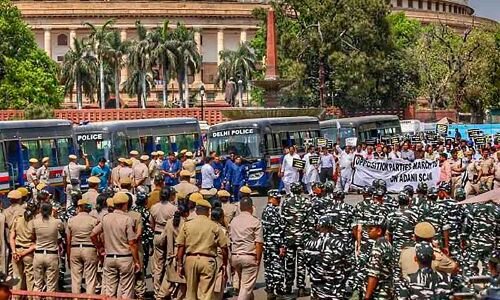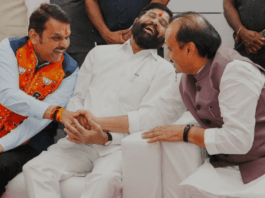On Monday, the 22nd of November, a group of opposition Members of Parliament (MPs) were stopped by the Delhi police from marching towards Vijay Chowk, a prominent landmark in the heart of India’s capital city. The MPs were protesting against the contentious farm laws that were passed by the Indian government last year.
The farm laws, which were passed in September 2020, have been a source of controversy and unrest in India ever since. The laws aim to deregulate India’s agricultural sector by allowing farmers to sell their produce directly to private buyers, rather than through government-regulated markets. Supporters of the laws argue that they will boost farmers’ income and increase investment in the sector. However, farmers and opposition parties have criticized the laws, saying that they will leave farmers vulnerable to exploitation by big corporations and weaken the existing system of government-regulated markets.
The protest march on Monday was organized by the opposition parties to demand the repeal of the farm laws. The MPs, led by Congress leader Rahul Gandhi, began their march from Parliament House and intended to proceed towards Vijay Chowk, where they planned to hold a demonstration. However, they were stopped by the police near the Parliament House gates and prevented from proceeding further.
The police cited Section 144 of the Indian Penal Code, which prohibits the assembly of more than four people in an area, as the reason for stopping the MPs. The police also said that the MPs had not obtained permission to hold a protest at Vijay Chowk. The MPs, however, argued that they did not need permission as they were only marching towards the Chowk and had no plans to hold a demonstration there.
The incident sparked criticism from opposition parties, who accused the government of suppressing their right to protest. Rahul Gandhi tweeted that the government was “scared of our peaceful protest” and that it was “afraid of democracy”. Other opposition leaders also condemned the police action, saying that it was a violation of their fundamental rights.
The incident is not the first time that opposition parties have been prevented from protesting against the farm laws. In September this year, several opposition MPs were suspended from Parliament for disrupting proceedings and demanding a discussion on the farm laws. The suspension was criticized by opposition parties as an attempt to stifle dissent.
The government has defended the farm laws, saying that they are necessary for the growth and development of India’s agricultural sector. Prime Minister Narendra Modi has said that the laws will empower farmers and give them more options to sell their produce. However, farmers and opposition parties remain unconvinced and have continued to demand their repeal.
In conclusion, the incident at Vijay Chowk highlights the ongoing tensions between the government and opposition parties over the farm laws. While the government maintains that the laws are necessary for agricultural reform, opposition parties and farmers argue that they will harm small farmers and benefit big corporations. The right to protest is a fundamental aspect of democracy, and it is important that all voices are heard in a peaceful and democratic manner.














